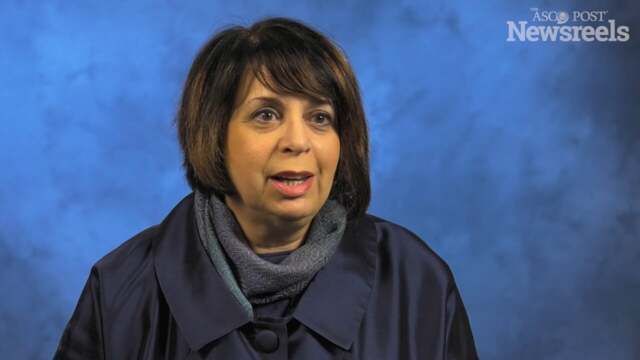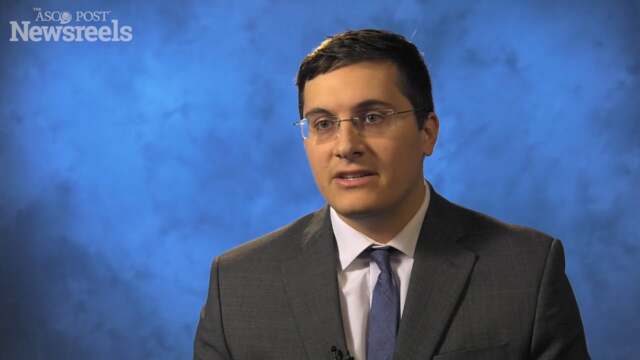Effect of Polypharmacy on Adherence to Adjuvant Endocrine Therapy for Breast Cancer
In a retrospective cohort study reported in the Journal of Oncology Practice, Calip et al found that polypharmacy overall was associated with increased adherence to adjuvant endocrine therapy for breast cancer. However, frequent use of some medication classes was associated with decreased...
Impact of 70-Gene Signature on Adjuvant Chemotherapy Decisions in Breast Cancer
In a Dutch observational study reported in the Journal of Clinical Oncology, Kuijer et al found that use of the MammaPrint 70-gene signature (70-GS) test changed physician-intended recommendations to administer adjuvant chemotherapy in half of patients with early-stage estrogen...
Mammography-Detected Small Breast Cancers May Represent Overdiagnosis, With Declining Mortality Reflecting Improved Systemic Therapy
In a study using Surveillance, Epidemiology, and End Results (SEER) data reported in The New England Journal of Medicine, H. Gilbert Welch, MD, of Dartmouth Institute for Health Policy and Clinical Practice, and colleagues found that screening mammography has resulted in a substantial increase in...
Predicting Acute Cardiac Events in Patients With Breast Cancer Receiving Radiotherapy
In a Dutch study reported in the Journal of Clinical Oncology, van den Bogaard et al found that a model including the volume of the left ventricle receiving 5 Gy (LV-V5) might provide improved prediction of acute cardiac events in patients with breast cancer receiving radiotherapy. Prior findings...
Acupuncture for the Management of Hot Flashes
The ASCO Post’s Integrative Oncology series is intended to facilitate the availability of evidence-based information on integrative and complementary therapies commonly used by patients with cancer. In this installment, authors Jun J. Mao, MD, MSCE, and Jyothirmai Gubili, MS, present a case study...
Online Symptom-Management Curriculum May Improve Depression and Fatigue in Breast Cancer Survivors
With thousands of devices to track and manage health and wellness, eHealth tools are beginning to transform modern health care and research, demonstrating quantifiable improvements in patient outcomes. According to the results of a randomized controlled trial (Reimagine), breast cancer survivors...
Expert Point of View: Ann H. Partridge MD, MPH
Ann H. Partridge MD, MPH, Director of Adult Cancer Survivorship Program at the Dana-Farber Cancer Institute, praised the “tremendous work” of Dr. Paskett and her colleagues but referred to the findings as “disappointing to say the least.”1 “Developing interventions to prevent or treat lymphedema...
Search Continues for Effective Way to Prevent Lymphedema in Breast Cancer Survivors
There was no difference in the incidence of lymphedema at 18 months in breast cancer patients randomized to a physical therapy intervention with education materials compared with a control.1 Although poor adherence to the intervention may have been a factor, these results, described as “very...
Suboptimal BMD Evaluation in Postmenopausal Women With Early-Stage Breast Cancer Receiving Aromatase Inhibitors
In a study reported in the Journal of Oncology Practice, Stratton et al found that most postmenopausal Medicare patients with early-stage breast cancer receiving aromatase inhibitor therapy do not receive recommended bone mineral density (BMD) measurements. Most expert panels recommend BMD...
Association of Metformin Use for Diabetes With Outcomes in HER2-Positive Breast Cancer
In an analysis from the phase III ALTTO trial reported in the Journal of Clinical Oncology, Sonnenblick et al found that among patients receiving adjuvant therapy for HER2-positive breast cancer, those with diabetes who received metformin had better outcomes than those who did not receive...
Researchers Find Evidence-Based Radiation Treatment After Lumpectomy Leads to High-Quality, High-Value Care
A new study demonstrates that the use of less radiation therapy for patients with breast cancer who have undergone lumpectomy does not negatively impact patient outcomes, and could result in significant reductions in health-care costs. These findings, which examine patient eligibility for...
Cancer Care Ontario and ASCO Clinical Practice Guideline: Use of Adjuvant Bisphosphonates and Other Bone-Modifying Agents in Breast Cancer
As reported in the Journal of Clinical Oncology by Dhesy-Thind, ofJuravinski Cancer Centre, Hamilton Health Sciences, and colleagues, Cancer Care Ontario and ASCO have issued a clinical practice guideline on the use of adjuvant bisphosphonates and other bone-modifying agents in breast cancer. The...
FDA Approves Ribociclib as Initial Therapy for Hormone Receptor–Positive, HER2-Negative Advanced or Metastatic Breast Cancer
On March 13, 2017, the U.S. Food and Drug Administration (FDA) approved ribociclib (Kisqali), a cyclin-dependent kinase (CDK) 4/6 inhibitor, in combination with an aromatase inhibitor as initial endocrine-based therapy for the treatment of postmenopausal women with hormone receptor–positive,...
ACC.17: History of Exercise Helps Prevent Heart Disease After Breast Cancer
Regular exercise appears to help mitigate the increased cardiovascular risk faced by women treated for breast cancer, according to a study scheduled for presentation at the American College of Cardiology's 66th Annual Scientific Session (ACC.17). The study found that women with breast cancer who...
Dutch Study Examines Effect of Internet-Based Cognitive Behavioral Therapy on Sexual Functioning in Breast Cancer Survivors
In a Dutch study reported in the Journal of Clinical Oncology, Hummel et al found that use of an Internet-based cognitive behavioral therapy intervention improved sexual functioning among breast cancer survivors. Study Details In the study, 169 women with a diagnosis of sexual dysfunction from 10 ...
Neoadjuvant Dual HER2 Blockade in HER2-Enriched Early Breast Cancer
In the Spanish phase II PAMELA study reported in The Lancet Oncology, Llombart-Cussac et al found that the HER2-enriched subtype was associated with the highest likelihood of pathologic complete response after neoadjuvant trastuzumab (Herceptin) and lapatinib (Tykerb) without chemotherapy in...
Cancer Has Aged Me
The news that I had breast cancer came at an especially difficult time in my life and was quite shocking to hear. My father had died of lung cancer just 1 month before my diagnosis, and I was still grieving his death when I suddenly had to confront my own mortality. In retrospect, the diagnosis...
An Oncologist’s Straightforward Guide for Women With Breast Cancer
If you Google the search term “breast cancer,” about 155,000,000 results will pop up in .83 seconds. Add to that pamphlets, journal articles, and library shelves bending under the weight of books written about breast cancer. That’s a mind-bending amount of information to parse through for the...
Phase III Trial Shows Improved Progression-Free Survival With Fulvestrant vs Anastrozole in Advanced Breast Cancer
In the international phase III FALCON trial, reported in The Lancet, John F.R. Robertson, MD, of the University of Nottingham, United Kingdom, and colleagues found that progression-free survival was improved with intramuscular fulvestrant (Faslodex) vs oral anastrozole in endocrine therapy–naive...
FALCON Trial Informs the Evolving Role of Fulvestrant in Advanced Hormone Receptor–Positive Breast Cancer
Endocrine therapy for breast cancer has evolved over the years. Initial endocrine therapies consisted of ablative procedures (oophorectomy, adrenalectomy, and hypophysectomy). With the availability of pharmaceutical estrogens, progestins, and androgens, ablative procedure utilization begin to...
Nicole Mittmann, PhD, on Breast Cancer Well Follow-up
Nicole Mittmann, PhD, of the Sunnybrook Health Sciences Centre, discusses her study findings on transitioning breast cancer survivors to primary care and the savings in resources and dollars that accrued as a result (Abstract 1).
Diana D. Jeffery, PhD, on Mental Health Comorbidities: Predictors of Cost and Utilization
Diana D. Jeffery, PhD, of the Defense Health Agency, discusses the need to screen for mental health comorbidities, including depression, anxiety, adjustment disorders, substance use disorders, and persistent mental illnesses, as shown in a study of breast and prostate cancer patients (Abstract 18).
Caleb Dulaney, MD, on Breast Cancer: Improving Online Patient Information
Caleb Dulaney, MD, of the University of Alabama at Birmingham, discusses ways to broaden and improve the quality of information that women with breast cancer find—in English and Spanish—on websites of nationally recognized cancer centers (Abstract 135).
Effect of Scalp Cooling on Hair Loss in Women Receiving Nonanthracycline Chemotherapy for Breast Cancer
In a prospective cohort study reported in JAMA, Rugo et al found that use of a scalp-cooling device reduced hair loss in women receiving nonanthracycline chemotherapy for early-stage breast cancer. Study Details In the study, 101 evaluable patients from 5 U.S. centers with stage I or II breast...
Phase III APHINITY Study: Adjuvant Pertuzumab/Trastuzumab/Chemotherapy Increased Invasive Disease–Free Survival in HER2-Positive Breast Cancer
Genentech, the Breast International Group, the Breast European Adjuvant Study Team, and the Frontier Science Foundation have announced positive results from the phase III APHINITY study. The study met its primary endpoint and showed that adjuvant treatment with the...
11-Year Follow-up of Adjuvant Trastuzumab in the HERA Trial
In the 11-year follow-up of the HERA trial reported in The Lancet, Cameron et al found that 1 year of trastuzumab (Herceptin) following adjuvant therapy for HER2-positive breast cancer remained associated with improved disease-free and overall survival compared with observation. No additional...
Poor Diet During Adolescence/Early Adulthood and Risk for Premenopausal Breast Cancer
Although adolescence is a highly susceptible time for mammary carcinogenesis, few prospective studies have examined the role of adolescent diet and breast cancer risk. Now, a study investigating the association of an adolescent and early adulthood dietary pattern that promotes chronic inflammation...
ASCO Quality Care 2017: Mental Health Conditions Contribute to Care-Related Costs, Hospital Visits in Breast and Prostate Cancers
A new analysis of data from the U.S. Military Health System found that mood and adjustment disorders such as anxiety and depression were strong predictors of the annual number of outpatient visits, hospital admissions, and number of days in the hospital for patients with breast and prostate...
ASCO Quality Care 2017: Study Examines Cancer Center Websites’ Information on Breast Cancer Treatment, Outcomes
As an increasing number of patients look to the internet for cancer information, researchers from the University of Alabama found that the websites of many National Cancer Institute (NCI)-designated cancer centers lack sufficient information to help patients with breast cancer understand all their...
Cholesterol-Lowering Medication Use and Breast Cancer Outcome in the BIG 1-98 Trial
In a study reported in the Journal of Clinical Oncology, Borgquist et al found that use of cholesterol-lowering medication during adjuvant endocrine therapy was associated with a reduced risk of breast cancer recurrence in hormone receptor–positive women in the BIG 1-98 trial. Study Details ...
Cancer Has Made Me the Person I Am
My breast cancer diagnosis in 1993, at age 34, came at the happiest moment in my life. I had gotten married just 10 months earlier and was looking forward to the future and children. But instead of celebrating my first wedding anniversary with my husband over a romantic dinner, we were at a cancer ...
Assessment of Therapeutic Response by Intrinsic Subtype for HER2-Positive Breast Tumors
In an analysis of outcomes in the North Central Cancer Treatment Group/Alliance N9831 trial reported in the Journal of the National Cancer Institute, Edith A. Perez, MD, of the Mayo Clinic Cancer Center, and colleagues found that patients with tumors scored as HER2-enriched or luminal subtype...
Results From MONALEESA-2: Are All CDK4/6 Inhibitors Equal?
Hormone receptor–positive breast cancer is the most common subtype of breast cancer, and while endocrine therapy has long been a mainstay of therapy for these patients, treatment resistance ultimately develops. Therefore, better therapeutic approaches are needed. There are some data to suggest...
First-Line Ribociclib Prolongs Progression-Free Survival in Hormone Receptor–Positive, HER2-Negative Breast Cancer
As reported by The ASCO Post from the recent European Society for Medical Oncology Conference, first-line treatment with ribociclib, a selective inhibitor of cyclin-dependent kinases 4 and 6 (CDK4/6), resulted in significantly longer progression-free survival vs placebo in women with hormone...
Chinese Trial Adds Utidelone to Capecitabine in Heavily Pretreated Patients With Metastatic Breast Cancer
In a Chinese phase III trial reported in The Lancet Oncology, Zhang et al found that adding the epothilone analog utidelone to capecitabine prolonged progression-free survival in women with heavily pretreated metastatic breast cancer refractory to both anthracycline and taxane treatment. Study...
More Patients With Early-Stage Breast Cancer May Be Able to Avoid Chemotherapy in the Future
Women with early-stage breast cancer who had an intermediate risk recurrence score from a 21-gene expression assay had similar outcomes, regardless of whether they received chemotherapy, a new study from The University of Texas MD Anderson Cancer finds. The research, published by Barcenas et al in ...
Olaparib Meets Primary Endpoint in OlympiAD Trial in BRCA-Mutated Metastatic Breast Cancer
On February 17, positive results were announced from the phase III OlympiAD trial comparing olaparib (Lynparza) tablets to physician’s choice of a standard-of-care chemotherapy in the treatment of patients with HER2-negative metastatic breast cancer harboring germline BRCA1 or BRCA2...
New Data on Prognostic Factors, Disease Detection, Drug Toxicities, and Treatment Adherence Presented at SABCS
The San Antonio Breast Cancer Symposium (SABCS) offers state-of-the-art information on all aspects of breast cancer biology, diagnosis, and treatment, drawing an international audience of more than 7,500 physicians, researchers, and other health-care professionals from over 90 countries. Through...
Study Finds Suboptimal Use of Adjuvant Endocrine Therapy in Breast Cancer
In a retrospective cohort study reported in JAMA Oncology, Daly et al found that recommended use of adjuvant endocrine therapy for breast cancer improved in the United States between 2004 and 2013 but remains suboptimal. The study included data on 981,729 women with stage I to III breast cancer...
Effect of Scalp-Cooling Device on Hair Loss in Women Receiving Chemotherapy for Breast Cancer
An interim analysis of the SCALP trial, reported in JAMA by Nangia et al, showed that use of a scalp-cooling device significantly reduced hair loss in women receiving chemotherapy for stage I or II breast cancer compared with no scalp cooling. The study was stopped early on the basis of efficacy....
Genetic Testing and Counseling Among Women With Newly Diagnosed Breast Cancer
In a population-based study reported in a research letter in JAMA, Kurian et al found that genetic testing and genetic counseling are suboptimal among women with newly diagnosed breast cancer. Study Details The study involved 2,451 women aged 20 through 79 years diagnosed with stage 0 to II...
Patients With Breast Cancer With Dense Breast Tissue More Likely to Develop Contralateral Disease
Patients with breast cancer with dense breast tissue have almost a twofold increased risk of developing disease in the contralateral breast, according to new research from The University of Texas MD Anderson Cancer Center. The study, published by Brewster et al in the journal Cancer, is among the...
Zoledronic Acid Every 12 Weeks vs Every 4 Weeks in Women With Breast Cancer and Bone Metastases
In the phase III OPTIMIZE-2 trial reported in JAMA Oncology, Hortobagyi et al found that an every-12-week schedule of zoledronic acid was noninferior to an every-4-week schedule in terms of skeletal-related event rate in women with bone metastases from breast cancer who were currently receiving...
Residual Cancer Burden, Breast Cancer Phenotype, and Long-Term Prognosis After Neoadjuvant Chemotherapy
In a study reported in the Journal of Clinical Oncology, Symmans et al found that residual cancer burden (RCB) after neoadjuvant chemotherapy was significantly prognostic for long-term outcome across breast cancer subtypes. Study Details The study included 5 patient cohorts from The University of ...
Serum DNA Methylation as Predictive Marker in Metastatic Breast Cancer
In the Translational Breast Cancer Research Consortium (TBCRC) 005 prospective biomarker study, reported in the Journal of Clinical Oncology by Kala Visvanathan, MBBS, MHS, of Johns Hopkins University, and colleagues, a cumulative methylation index was found to be predictive of progression-free...
Nearly Half of Patients Treated for Early-Stage Breast Cancer Report at Least One Severe Side Effect
Nearly half of women treated for early-stage breast cancer reported at least one side effect from their treatment that was severe or very severe, according to a new study published by Friese et al in Cancer. Although it might be expected for women undergoing chemotherapy, researchers found...
Accelerated Partial-Breast vs Whole-Breast Irradiation After Breast-Conserving Surgery
As reported in The Lancet Oncology by Polgár et al, 5-year late side effects and cosmetic results were similar with accelerated partial-breast irradiation (APBI) with interstitial brachytherapy vs whole-breast irradiation (WBI) after breast-conserving surgery for low-risk invasive and in...
Expert Point of View: Amber Orman, MD
Amber Orman, MD, of the Department of Radiation Oncology, Breast Section, at Moffitt Cancer Center in Tampa, Florida, who was not involved in this study, said: “This study provides guidance when deciding how best to integrate postmastectomy reconstruction and radiation therapy. This is an area...
Autologous Breast Reconstruction Associated With Fewer Complications and Failures Than Implants in Women Who Have Received Radiation
Postmastectomy radiation is becoming more commonly used to treat breast cancer, and at the same time, there is an increasing trend among women to have breast reconstruction. Until now, oncologists have had little evidence on what the best reconstruction options are in women who require radiation...
Expert Point of View: Virginia Kaklamani, MD, and Melinda L. Telli, MD
Moderator of the press conference on this study, Virginia Kaklamani, MD, of the University of Texas Health Science Center at San Antonio, agreed that an improvement in response is important. “If you are a patient with symptoms, such as a cough from lung metastases, and I give you a combination...



